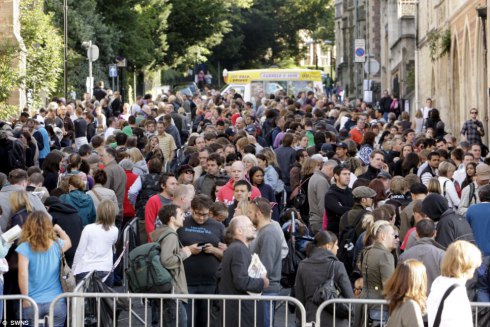
It started at the grill.
Trapped In The 1960s: Immigrant Relative Visas
Like every summer.
I, along with a few friends, sponsor an annual day-long neighborly celebration. A community-wide barbeque. (I’m the master chef. It’s my Bobby Flay imitation.)
No invitations required. If you’re in the ‘hood, stop by, so we can get to know each other.
This year, as usual, talk turned to social issues. With me around, that’s not uncommon. After all, how can I get to know you, if I don’t know your political views?
“Carlos,” one of the new neighbors noted, “you’re stuck in the 1960s.’
“Yup”, I responded, “I am.”
I pressed forward.
“Civil rights, environmental destruction, race relations, gender discrimination, education disparity between rich and poor.”
“What’s changed?”
“Aren’t we, as a society, stuck in the 1960s?”
“Aren’t we fighting the same political, social, and economic battles?”
“Aren’t we fighting those who want to reverse the gains made in these areas back in the 1960’s and after?”
“The same subset of society opposed to those gains in the first place?”
“Of course, we’re stuck in the 1960s. We all are.”
Unsure how to reply, my neighbor nodded his head in agreement.
We got back to munching.
Flawed Political Motivation,
Defective Immigration System
Similarly, when it comes to immigration, although the 1965 Act opened the door for immigrants from different parts of the world, anti-immigrant attitudes have not changed much since the 1960s.
“We should remember that people accustomed to such marginal existence in their own land will tend to live fully here, to hoard our bounteous minimum wages and our humanitarian welfare handouts … lower our wage and living standards, disrupt our cultural patterns.”
That’s not Donald Trump speaking.
That’s rhetoric from the 1965 debates over changes to the Immigration and Nationality Act.
Yes, we are stuck in the 1960s, even on immigration issues. We’re fighting many of the same battles, merely camouflaged in new political disguises.
Moreover, immigrants are stuck in a defective immigration system created in 1965 . . . a system better than its predecessor but nonetheless defective . . .
. . . created in a manner to accommodate a Congress – of which many were opposed, many were lukewarm to the idea, and few were truly supportive of immigrant-friendly legislation.
Like Congress today.
Recommended Reading:
Lest the point go under-appreciated, it seems common sense that an immigration system built on flawed premises will ultimately lead to defective performance.
Yet, a few years ago, at the height of the current Congressional debate over how to reform immigration, the president and his cohorts exhibited this same shortcoming. They continually stressed immigration reform legislation must be built around the tenet that immigrants must wait their turn in line to enter the U.S. legally.
In a nutshell they asserted . . .
. . . Immigrants cannot jump to the front of the line . . . they must get in line . . . the back of the line.
This was a smoke screen.
Being an Escondido immigration attorney, I can attest that most immigrants, both documented and undocumented, do not oppose the first in time, first in right nature of waiting in line for their visas.
The refrain was a political distraction from the bigger issue. The visa waiting line is broken.
By focusing attention on those who “cut in line”, Congress and the president sidestepped solutions for fixing the broken waiting line for mixed-status families, while preserving a family oriented immigration system.
When Congress did venture into discussing fixing the visa line, they diverted attention over to S.744, a proposal which would have replaced the family-based immigration system with an employment-based system.
Notwithstanding political platitudes to the contrary, this maneuver was intended to protect xenophobic proclivities against immigrants “accustomed to a marginal existence”.
The Wait For Immigrant Visas:
A Cruel Joke And Hasty Solutions
The broken nature of the visa waiting line is not new news.
According to a recent State Department report, over 4.4 million people are on immigrant visa waiting lists. In the past year, the line grew by over 100,000 individuals.
About 98% of visa delays stem from petitions filed by family members for their relatives. Of this total, the longest delays are related to families in the bottom two immigration categories – (a) married children who are sponsored by their U.S. citizen parents and (b) siblings sponsored by their U. S. citizen brothers or sisters.
Waiting List For Legal Immigrant Visas Keep Growing
April 17, 2015, Jessica Vaughan, Center for Immigration StudiesMore than half of the waiting list is comprised of about 2.5 million people who have been sponsored by a sibling who is a U.S. citizen. These applicants must wait at least 13 years for their application to be adjudicated. The largest number (30 percent) are citizens of Mexico, and the wait for them is just over 18 years.
Another 806,000 applicants are adult married sons and daughters of U.S. citizens. The wait for most applicants in this category is just over 11 years. However, about 40 percent of those waiting in this category are from Mexico and the Philippines, and their wait is more than 20 years.
Based on these figures, the Center For Immigration Studies, an organization opposed to new or expanded pathways to legalization, has labelled the U.S. immigration system a cruel joke for millions of immigrants in the third and fourth categories.
As a solution, the Center recommends eliminating them.
A Disguised Attack On
Family-Based Immigration
I agree with the CIS analysis . . . to an extent.
An immigration system which promises the opportunity of a green card to millions of immigrants whose applications cannot be processed within a reasonable time frame is a joke.
However, the solution is not to dump immigrants in a legal wasteland.
Rather, the wiser course is to fix the system so paperwork moves quicker through the system and waiting time is shortened.
The CIS view carries a long-term danger greater than eliminating the ability of U.S. citizens to immigrate their married sons and daughters over 21, and their brothers and sisters.
If the ability of U.S. citizens to immigrate relatives can be curtailed, then the demise of a family-based green card system is one step closer to becoming the law of the land.
In my view, underlying the CIS proposal is a belief the majority of those citizens seeking to sponsor their older children and siblings were, at one time, lawful permanent residents.
They were, at one time, immigrants themselves.
In other words, the proposal penalizes naturalized citizens.
Since the 1960s, off and on, immigration opponents have pushed for an employment-based immigration system.
Even after the passage of the 1965 Immigration and Nationality Act, the cries never completely died.
A Call For Renewed Immigrant
Vigilance In A New Year
As noted, had S.744 passed, the current system would have been depleted.
Sadly, unaware or uncaring that the family-based immigrant visas process was on the verge destruction, I watched several pro-immigrant advocates willing to go along with the proposal.

Most immigrants, of course, did not understand the proposal in depth.
By and large, they relied on the advice of community spokespersons, non-profit leaders, and immigration lawyers – many of whom simply followed the path set forth by their favorite political figures.
The battle over S.744 exposed not only a startling lack of insight, but also an alarming degree of opportunism within the ranks of pro-reform activists.
Unfortunately, as a new year dawns, the danger of flawed immigration reform proposals persist.
The fight over our nation’s immigration direction, after all, is far from over.
As we head into an election year, the public momentum for comprehensive immigration reform appears to have waned.
In the view of most media pundits, ICE raids, announced just two days before Christmas, is a sign that pro-immigrant legislation is not likely to take place this year.
Really?
Certainly, proposals emanating from the Donald Trump school of ideology will not court any favor from pro-immigrant communities.
But half-baked solutions are likely to emerge from a various political camps, including those of Democratic Party candidates.
Hence, immigration activists need to be vigilant not to fall for promises leading to a dead end . . . or worse, for ideas that subtly set in motion a transformation of the entire system away from a family unity approach to immigrant visas and permanent residence.
By the way, Happy New Year!
By Carlos Batara, Immigration Law, Policy, And Politics





